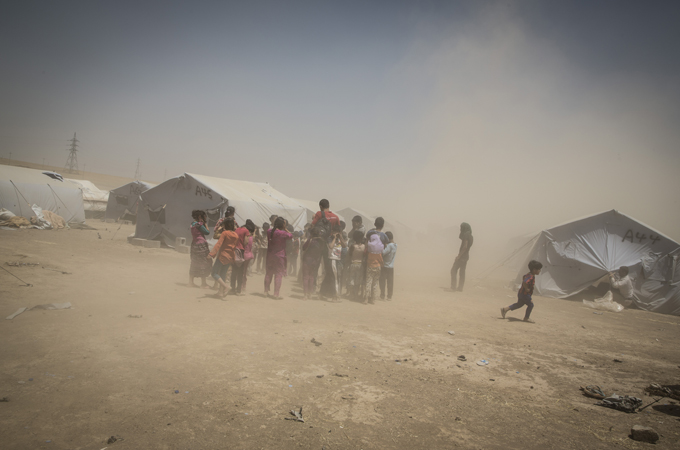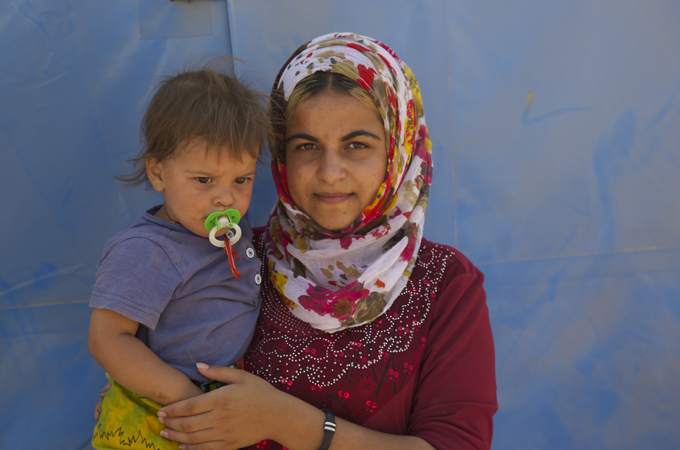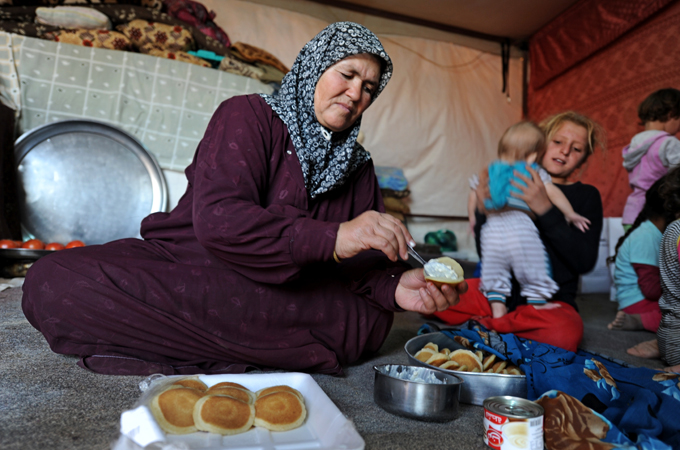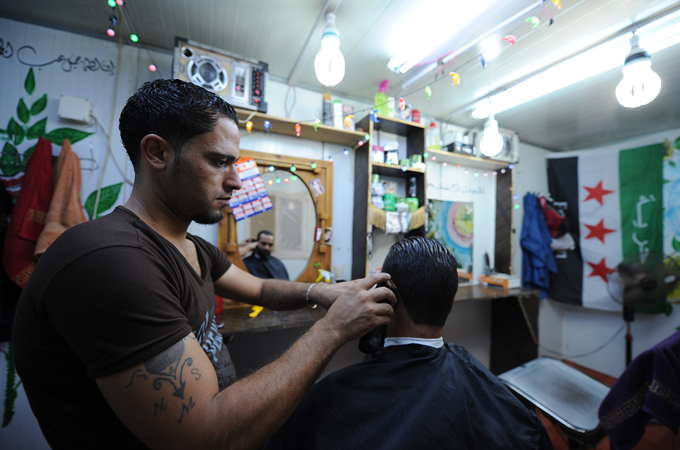Photo Essay: Ramadan in exile
This Ramadan thousands of displaced Iraqis and Syrians are forced to observe the Islamic holy month in refugee camps.

More than one million Iraqis and three million Syrians have been displaced this year, forced to flee their homes the families observe Ramadan this year in a state uncertainty.
Many have lost all their possessions and are now dependent on humanitarian aid.
Keep reading
list of 4 itemsPalestinian Prisoner’s Day: How many are still in Israeli detention?
‘Mama we’re dying’: Only able to hear her kids in Gaza in their final days
Europe pledges to boost aid to Sudan on unwelcome war anniversary
Save the Children, a UK based charity, met some of the displaced families in Iraq, Jordan and Egypt to see how they are living during this Ramadan away from home.
 |
| [Hedinn Halldorsson/Save the Children] |
In Khazar transit camp, a Save the Children child protection officer, a Syrian refugee himself, plays with children during a sandstorm as they wait for a safe area to be opened just for them.
Thousands of Iraqis displaced this year are facing their first ever Ramadan away from their homes in extremely harsh desert conditions, in searing heat, poor shelter and with very basic food.
The latest spike in Iraqis’ displacement came less than a month before Ramadan when thousands fled from Mosul, Tikrit and other cities into the relative safety of the Kurdistan Region in Iraq, which was already hosting 250,000 Syrian refugees and other Iraqis displaced earlier this year from Anbar.
A growing number of people are now staying in a hastily set-up camp near the Khazar checkpoint on the outskirts of Erbil, 40km from Mosul, where the number of displaced Iraqis grows by the day.
 |
| [Sam Davies/Save the Children] |
Aisha, 20, and her daughter Farrah, 1, stand outside their tent in Khazar transit camp on the outskirts of Erbil. Her husband killed during the confict, Aisha fled with her daughter and her husband’s family from Mosul when the conflict broke out last month.
“I’m trying to fast this Ramadan but it’s very difficult,” Aisha said.
“It’s so hot here, we have no electricity, no water. My family is all fasting and we’re doing it together. I’m here with my husband’s family; he was killed several months ago so now I am alone with my daughter. This will not be a happy time like it has been in previous years.”
Displaced families are now staying in hastily set-up camps outside the cities of Erbil and Dohuk, as well as schools, mosques, community centres and abandoned buildings. Hundreds, sometimes thousands of people continue to stream into the region every day escaping the violence.
 |
| [Sam Davies/Save the Children] |
Mohammed, 2, sits in the area his family now uses as a kitchen in their tent at Khazar camp.
His mother arrived from Mosul several weeks ago, along with her husband, mother-in-law and five children, aged two to seven.
“Normally I fast every year for Ramadan, praise be to God. But this year, how can we fast when there is no food to break our fast in the evening?” she said.
“We have no bread, no meat. At home I would be in my kitchen preparing food for the family along with my relatives, but here you can see – we have no kitchen, just this tent.”
“It makes me really sad to be spending Ramadan like this because normally it’s such a happy time. The first few days of Ramadan are like a festival, with everyone out in the bazaar buying sweets and treats at night. But this year, our lives are totally different.”
 |
| [Karl Schembri/Save the Children ] |
Syrian children find their own fun and play outside their makeshift tents on a tomato farm as their parents prepare food for iftar (the evening meal).
Syrian refugees live in equally harsh conditions, displaced by the protracted war back home that has displaced more than 3 million Syrians, half of them children.
There are more than 605,000 Syrian refugees living in Jordan. Four out of every five refugees live outside camps, mostly renting substandard housing or staying in informal settlements like this one on the outskirts of Amman.
 |
| [Karl Schembri/Save the Children] |
Um Ahmad, a Syrian refugee from Hama, prepares the traditional qatayef sweets, very popular during Ramadan, minutes before the breaking of the fast in a tent on the outskirts of Amman. The grandmother is surrounded by some of her grandchildren as she prepares.
“I’m not happy,” Um Ahmad said. “My children are dispersed everywhere. Some are in Azraq Camp, some in Syria, it’s heart-breaking to spend Ramadan away from them. We always used to have iftar together.”
Um Ahmad (centre) is breaking the fast with her children and grandchildren, in their tent on the outskirts of Amman. They fled Hama two years ago and have been living in Jordan since.
“We can’t afford to have meat today so we’re just having vegetables,” Um Ahmad said.
“It is one of our traditional values, to share whatever we have particularly during Ramadan. We used to have much more to share; in Syria we’d slaughter a sheep and share it with our neighbours. It feels like that was ages ago. I miss Syria too much.”
 |
| [Karl Schembri/Save the Children] |
Anas, a Syrian refugee from Deraa, makes traditional Ramadan sweets at his little shop in Zaatari Camp, Jordan.
“Business is good at this time of the year,” a beaming Anas said. Back in Deraa, he worked in a confectionary, and last January he decided to open his own stall in Zaatari. “We have to make the best of what we have and stay positive. There are many more who are in a worse situation. We always have to thank God for whatever we have.”
 |
| [Karl Schembri/Save the Children] |
At night after iftar, Zaatari Camp turns into a hive of activity, with families coming out of their tents and caravans for a stroll or to buy their items from the main market street. Home to 90,000 refugees, the camp comes back to life after 16 hours of fasting.
Ziyaad, a Syrian refugee from Deraaa, gets his first customer tonight at his barber shop that he has been running for the last year.
“You can’t compare Ramadan here to how it was back home but one tries and make the most of it,” he says. “We will hopefully return soon to our homes.”
*Names have been changed to protect children and relatives.